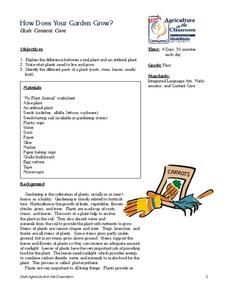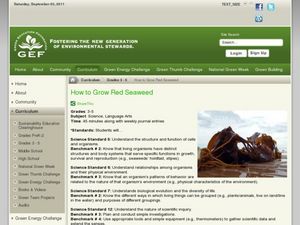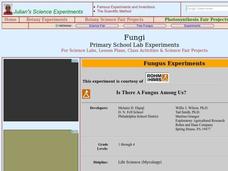Curated OER
Plant Transpiration
Students conduct various experiments to investigate plant transpiration. In this biology lesson, students explain how this process helps maintain the hydrologic cycle. They measure the rate of water loss in plants using a potometer.
Curated OER
How Does Your Garden Grow?
Students identify what plants need to grow. In this plant biology lesson, students analyze the differences between an artificial plant and a live plant. Students plant seeds and discuss what plants need to grow. Students observe the...
Curated OER
Evidence of Photosynthesis
Hands on science is the way to go! Learners conduct a lab experiment to help them explain how plants make food through photosynthesis. They test for the presence of starch in leaves using iodine solution and identify the basic things...
Curated OER
Chlorophyll
Students explain the importance of chlorophyll in plants. In this biology lesson, students extract chlorophyll from different plant sources using chromatography. They discover the different factors needed for photosynthesis to take place.
Curated OER
How To Grow Red Seaweed
Students explore ocean biology by participating in a plant growing activity. In this seaweed lesson, students identify the importance and uses of seaweed in the ocean and examine different seaweed samples. Students utilize an aquarium,...
Curated OER
Terrestrial Sequestration - Photosynthesis and Cellular Respiration
Students investigate how plants absorb carbon dioxide during photosynthesis. For this biology lesson, students differentiate photosynthesis and cellular respiration. They discuss the important role of plants in the environment.
Curated OER
Photosynthesis
Students conduct a variety of experiments on photosynthesis. In this biology lesson, students identify the factors required for the process to occur. They perform computerized experiments to test the amount of oxygen produced when plants...
Curated OER
Fungi
Students examine the characteristics of fungi. In this biology lesson, students investigate the factors needed for fungi growth. They collect data and observations and write a report about them.
Curated OER
Terrariums for Project Pals
Students identify the components needed by plants to survive in the terrarium. For this biology lesson, students build their own terrariums using materials available. They present their project in class.
Curated OER
Can Photosynthesis Occur at Saturn?
Students identify the different requirements for photosynthesis to take place. In this space science instructional activity, students simulate conditions in Saturn to investigate if photosynthesis is possible there. They use data and...
Curated OER
What is Rice?
Second graders investigate the agricultural process of rice farming by creating a rice stationary item. In this farming lesson, 2nd graders read about rice plants and the techniques used to harvest the edible plant. Students discuss...
Alabama Learning Exchange
Botany Scavenger Hunt Where's the Ginkgo?
Learners use a science journal to log plants that are native to Alabama. In this plant lesson plan, students identify characteristics, describe environments, and classify the plants that they find.
Curated OER
Domestic Water Supply Case Study
Students follow the cycle of a raindrop from its source into the water supply for their houses and then back to the environment. They draw and, properly label and explain a diagram of a water treatment plant and a sewage treatment plant.
Curated OER
Water Quality
Students play the role of scientists testing for water quality in the area. In this ecology lesson, students determine the water sample's pH, temperature, dissolved oxygen and turbidity. They write a journal reflection after the activity.















